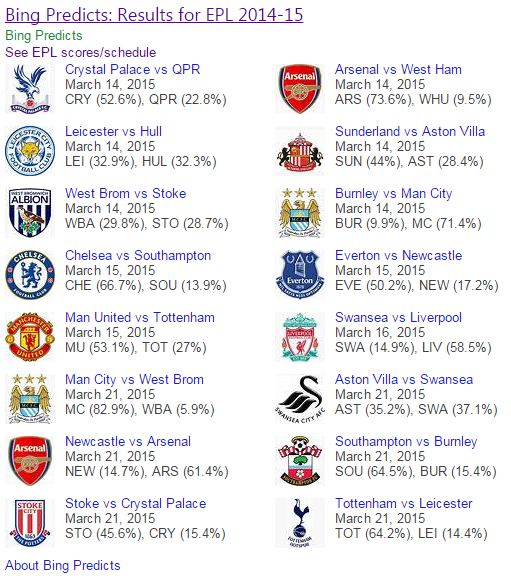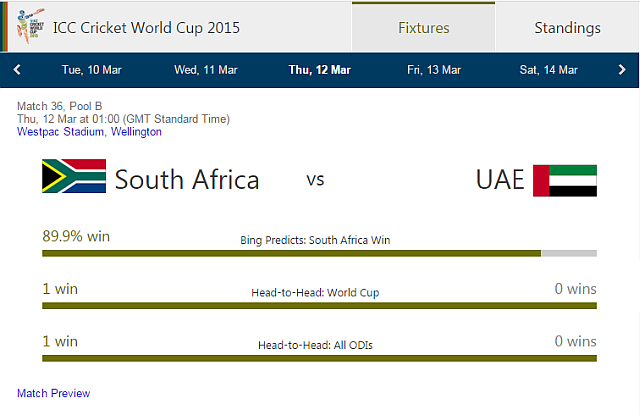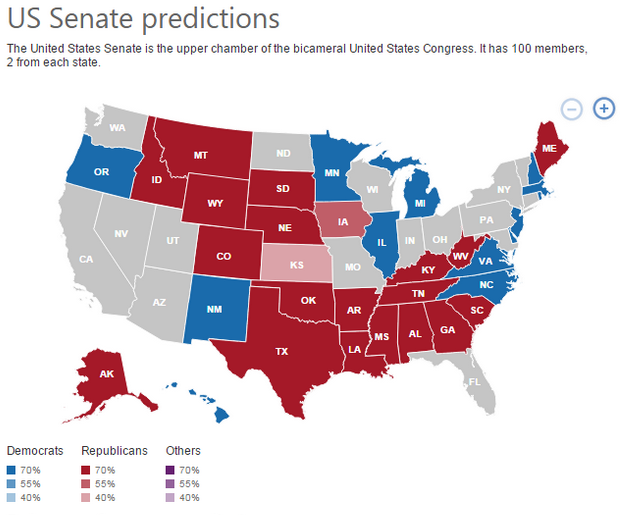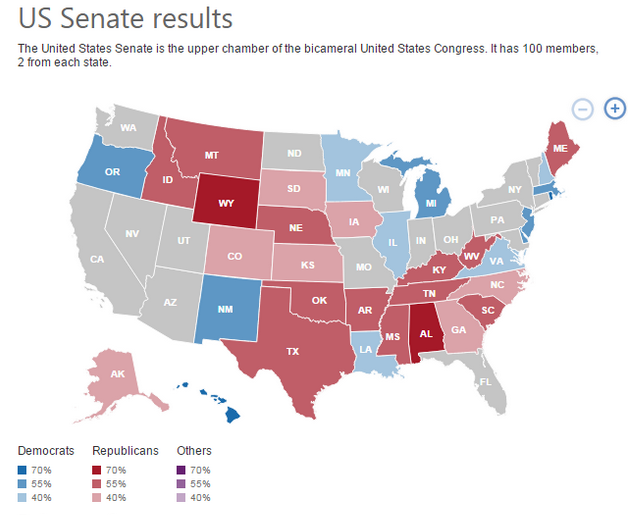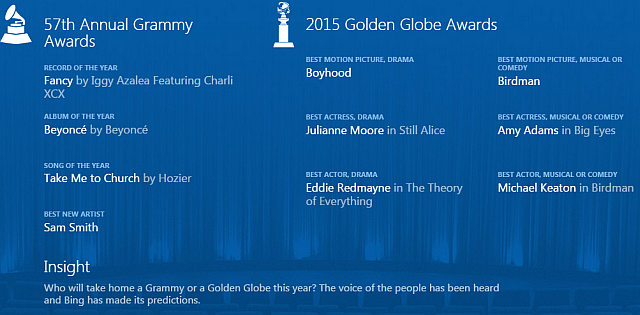The Microsoft Bing search engine has moved from strength to strength.
Mooted as a valid challenger to the mighty behemoth of search, Google, many users quickly became frustrated with Redmond's take on proceedings. Someone at Microsoft clearly took note. There was a shift in emphasis. It was no longer "Bing and decide," as Microsoft decided "Bing is for doing."
And so we arrive here, in 2015, on the back of Bing having correctly predicted the outcome of Superbowl XLIX, a glut of English Premier League results, around 95% of the US-Midterm Election results, and most recently nailing some 84% correct predictions for the Oscars, including Best Actor, Best Actress and Best Director.
Time to quit your day job and start gambling via Bing Predicts? Not quite, but let's have a look at how Bing has become just so good at predicting the future.
It's a Numbers Game
"It all started with a snowy day"
Well, that is the gospel according to Walter Sun, Development Manager for the Core Ranking team at Bing. Noting the spikes in concentrated search terms before snowfall events, they could accurately predict the time and location of a snowfall event without checking the weather forecast. Bing Predicts was suddenly on the horizon and within a handful of months appeared on our screens.
Central to the success of Bing Predicts is popularity. Following the assumption that popularity will provide corresponding winners and losers, the Bing engine analysis a number of signals from across the web providing a "background" evaluation of each parties potential for success. The signals include, but are not limited to social media, social media searches, regular search, biases and regional trends.
And it worked. The first fully fledged, public Bing Predicts attempts was for "talent-show" American Idol. Bing ranked the 13 final contestants, accurately predicting winner Caleb Johnson. Success all round.
Different Rules for Sport
Predicting the outcome of sporting events isn't so easy. Data generated by shows such as American Idol and the like can be funneled through enough basic metrics to make predicting the outcome a challenge, but still base it on popularity.
Sporting events do not work like that. Indeed, the English FA Cup is testament to this prediction problem where teams ranked significantly lower than their oppositions beat top-tier opponents. Even Bing could not see Bradford City defeat Chelsea 4-2 away (Bradford are around 60 places, and two whole divisions lower than Chelsea), or Premier League Champions Manchester City lose to second-tier Middlesbrough.
That said, it does have a remarkably accurate record when predicting sporting events. Instead of popularity, sporting predictions are based on historical team data: previous wins, championship successes, previous form, historical results between clubs and more. As well as this, the Bing prediction engine also evaluates key player data for each team: top scorers, assists, possession, goals conceded and more.
Finally, it leverage's expert opinions from leading news sources, and the predictions contained within those pre-game reports to provide a percentile fraction of the chance of winning. The prediction engine can build accurate projections of what's to come in your sport come the weekend – but it also doesn't hesitate to state an event is too close to call, rather than list it as a draw.
A Show of Data Processing Power
The whole prediction engine affair is likely to continue. After all, it's awesome if your team wins at the weekend, even better if you placed a winning wager, and if all else fails it gives you someone else to blame your team's performance on.
For Microsoft, it is a not-so-subtle show of tech prowess to its nearest rivals Apple and Google. Microsoft can illustrate the sheer weight of numbers behind its Bing search engine through an exciting, accurate visual portal. It is competitive, and what's more, the black and white approach to winner/loser/right/wrong helps validate our own experiences – or disproves them.
Microsoft researcher, and serial predictor David Rothschild believes the prediction engine is "an interesting way to show users that Bing has a lot of horsepower beyond just providing good search results."
Data is everything. Even regular Internet users understand the translation of data to power, so Microsoft's bold step forward with their predictions underscores the confidence in their own algorithms, and their ability to handle the data coming into Redmond.
I think he's right. I've never been too wowed with Bing's search facilities, and despite efforts to stand apart from Google results, I still believe Google Search is more powerful. But in terms of attracting me to the portal, engaging with Bing and searching using that engine, Microsoft are on the right track.
Detracting From the Event?
Knowing the final score detracts from the event itself. Bing predictions of the Oscar's winners soured the unpredictability of the Oscar's judges. Seeing Tom Brady lead The Patriots to another Superbowl victory was undermined – we knew it would happen anyway. It is a fine line between reading all news before an event, guessing the outcomes with friends, and then watching something different unfold. Isn't this the essence of some forms of entertainment – the "wow" or "omg" factor?
Outside of the current populist approach, the Bing prediction engine could be used to help major social issues. Imagine what it would be like if we could predict the requirements for specific medicines and preventatives for a single area through the rate of search, or dynamically respond to predicted flow in production to save resources.
In some industries this is already the nature of the game: think energy and banking futures, for one. In reality, many industries are already implementing futures analysis. All good businesses have one eye on the future, and in many cases, altering production isn't cost effective in the short-term.
If Microsoft can truly harness the power of predictions, and the big data associated with it I can see more visitors arriving at the Bing portal. And with more individuals interacting with the expanse of Microsoft online services, there will be much to cheer in the near-future for Redmond.
You know, I think they might have predicted that...
What's your take on the intelligence of Bing Predicts? Do you think they have a winner?



